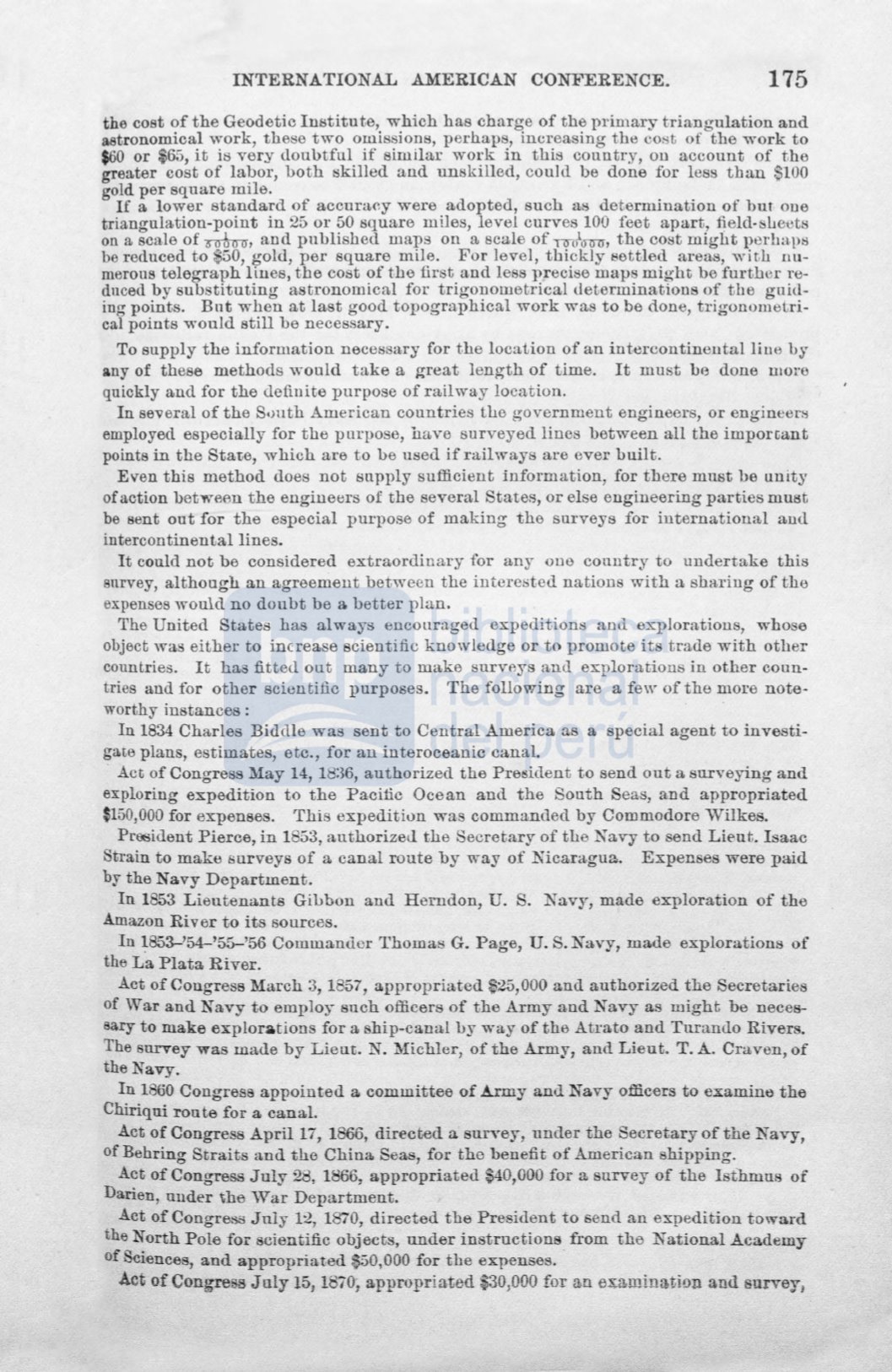

INTERNATIONAL AMERICAN CONFERENCE.
175
the cost of the Geodetic Institute, which has charge of the primary triangulation and
astronomical work, these two oruissions, perhaps, increasing the cost
of
the work to
$60
or $65, it is very doubtful if similar work in this country, ou account of the
greater cost of labor, both skilled and unskilled, could be done for less than $100
gold per square mile.
·
If
a lowe.r standard of accuraey were adopted, such as determination of but one
triangulation-point in 25 or 50
squa.remiles, level curves 100 feet apart, field-sLeets
on a scale of
ocrk-rr,
and publishecl maps ou a scale of
TOo1
0ll"
1
r,
the cost might perbaps
be reduced to
~50,
golcl, per square mile. For level, thickly settlecl areas, wi
tli
nu–
merous telegraph linea, the cost of the first and leas precise maps might be further re–
duced by substituting astronomical for trigonometrical determinations of the guid–
ing points. Bnt when at last good topographical work was to be done, trigonometri–
cal points wonld still be necessary.
To supply the information necessary for the location of an intercontinentalliue by
any of these methods would take a great length of time.
It
must be done more
quickly and for the definite purpose of railway location.
In
several of the s.mth American countries the government engineers, or engineers
employed especially for the purpose, have surveyed lines between all the important
points in the Staw, which are to be used if railways are ever built.
Even this method does not supply sufficient information, for there must be unity
ofaction betweAn the engineers of the several States, or else engineering parties must
be sent out for the especial pu.rpose of making the surveys for international and
intercontinentallines.
It could not be considerad extraordinary for any one country to undertake this
snrvey, although an agreement between the intm·est ed nations with
a
sharing of the
expenses would no doubt be a better plan.
The United States ha-s always enconraged expeditions and e:xplorations, whose
object was either to increase scientific knowleclge or to promote its trade with other
counLries.
It
has fitted out many to make survt1ys and explorations in other cono–
tries and for other scientific purposes. The following are a few of the more note–
worthy instances :
In 1834 Charles Biddle was sent to Central America as a special agent to investí–
gata
plans, estimates, etc., for an interoceanic canal.
Act of Congress May 14, 18:36, authorizecl the President to send out a surYeying and
exploring expedition to the Pacític Ocean aud the South Seas, and appropriated
$150,000 for expenses. This expeditiun wa commanded by Commodore \Vilkes.
President Pierce, in 1853, authorized the Secretary of the Navy to sencl Lieut. Isaac
Stl.·ain
to
make surveys of a canal route by way of :Kicara.gua. Expenses were paid
by
the Navy Department.
In
1853 Lieutena.nts Gibbon and Herndon, U. S. Navy, made exploration of the
Amazon River to its sources.
In 1853-'54- '55-'56 Commandor Thomas G. Page,
U.
S. Navy, made explorations of
the La Plata River.
Act of Cougress March
3,
1857, appropriated $25,000 and authorized the Secretarias
of War and Navy to employ such officers of the Army and Navy as might be neces–
sary to make explorations for a ship-canal
hy
way of the Atrato and Turando Rivera.
The survey was made by Lie ut. N. Michler, of the Army, and Lieut. T. A. Craven, of
the Navy.
In 1860 Congress appointed a committee of Army and Navy officers to examine the
Chiriqui route for a canal.
Act of Congress April17, 1866, directed a survey, under the Secretary of the Navy,
ofBehring Straits and the China Seas, fo1· the benefit of American hipping.
Act of Congress July 28, 1866, appropriated $40,000 for a survey of the Isthmu of
Darien, uuder lihe 'Var Department.
Act of Congress July 12, 1870, directed the President to send an e.xpedition toward
the North Pole for scienti.fic objects, under instructions from the National Academy
of Sciences, and appropriated $50,000 for tbe expenses.
Act
ofCongre
B
July
15
1
1870, appropriated $30,000 for an e4amination and urvey
1
















